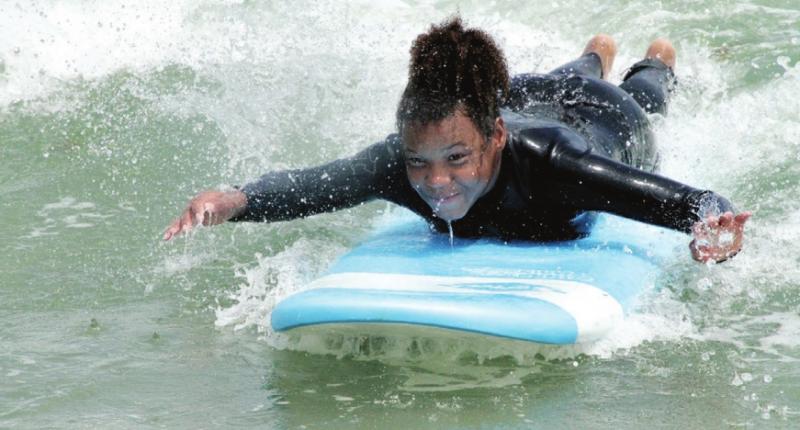
Elmani DeBarros, 14, catches a wave after a brief lesson on a New Hampshire beach.
St. Peter teen group try out sport in N.H.
On a foggy New Hampshire beach, a group of about two dozen Cape Verdean teenagers gleefully struggle to balance atop surf boards. For many, it is their first time trying the water sport. They laugh and yelp while paddling toward the horizon. Then, when they reach waist-deep depth, an instructor guides them into position. They turn back to face the coastline, bellies down, toes toward the rear of the board. With a gentle push and precisely-timed command to “pop up,” they attempt to move swiftly from prone to standing, to catch the wave.
“It feels good,” said first-time surfer Nadine Paiva after successfully surfing back to the shore. “The waves come, and you’re light.”
Elmani DeBarros, another firsttimer who was able to mount the rolling waters at Hampton Beach, said, “You can feel, like, a surge of energy, or like force pushing you. At the right time, you stand up, and you ride it.”
At the end of a brief lesson and two hours of surfing, only a few can ride the board back to shore like Paiva and DeBarros. Still, the annual surfing trip is highly coveted among the teenagers at the Teen Center at St. Peter Catholic Church in Dorchester. Organizers say it’s a multi-purpose outing that gets to the heart of the center’s mission to serve the youth in the Bowdoin-Geneva corridor, where gang violence has been a problem in the past. The experience motivates them to be mindful of their behavior and cultivates personal growth.
“Getting to the ocean just in itself is a beautiful thing,” said Steve Whalen, founder of City Realty real estate company. He began sponsoring the trip four years ago after developing a relationship with one of the Teen Center’s founders.
“You could spend your money on school books, but every once in a while you have to have a good time,” Whalen said, adding that people can learn a lot from trying new things.
“It makes me proud,” said Joao Dos Santos, the center’s program director. “It shows me they’re able to learn even without our staff that’s in the classroom daily with them, but with other people.”
Before joining the staff, Dos Santos started going to the Teen Center when he was 13. He said beyond the annual surf trip, the institution provides structure and safety for kids in the neighborhood, giving families peace of mind.
“Everything that we do here is important, because it takes the kids out of the street. It makes the parents feel more comfortable,” said Dos Santos. “Their kids are safe here, and they’re learning something, and they’re surrounded by role models and people that care about them.
Both Paiva, 13, and DeBarros, 14, agree that beyond the fun outings, the Teen Center helps them make different cultural adjustments.
“When I came, I didn’t know how to say, ‘Hi,’” said Paiva, 13. Her family moved from Cape Verde less than a year ago to join the city’s Cape Verdean population, which is about 15,700 people, according data from the Office of Economic Development. Paiva said without the Teen Center, she’d likely still be struggling to comprehend English.
Speaking to new people in English is still hard, she said, “but not as difficult as nine months ago.”
Meanwhile, DeBarros, who was born in Boston and speaks both Cape Verdean creole and English at home, said the center provides the kind of culturally-affirming friendships he does not find in school. He is a METCO student in Newton.
“They’re like my culture,” he said of the friends he’s made in his first summer session at the Teen Center. “It feels like I belong here, ... like I’m in the right place.”
Those feelings of familiarity, safety and affirmation are precisely the things Teen Center founder Paulo Amado De Barros felt he was missing when he arrived in the U.S. almost 30 years ago.
”I always had an idea of creating a youth center for Cape Verdeans, because as a young person, when I came, it was hard to integrate,” he said. De Barros described the tightknit community he left in Cape Verde as a place where neighbors talked to each other, looked after each other’s children and regularly shared meals. Adjusting from that highly communal culture can be challenging.
“Here’s it’s hard because, if you say hi to people sometimes, they don’t want to answer, or they give you sarcasm, or they think you’re crazy for talking to them. That makes people shut down,” he explained.
De Barros said the center should serve as a model for others who work with large populations of immigrant and first-generation youth.
“[It’s] a place where Cape Verdeans can go and feel integrated, like they have a safe place where they can promote their culture, while they’re trying to assimilate to another culture and not [lose] the culture and the language that they learned from back home,” he said.
Saraya Wintersmith covers Dorchester, Mattapan and Roxbury for WGBH News.